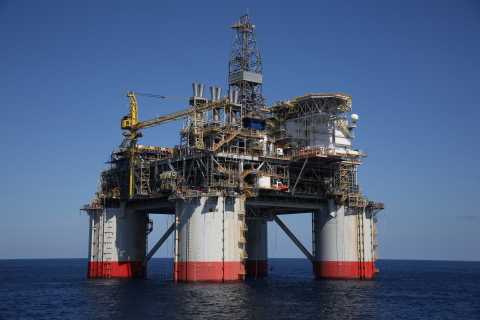SAN RAMON, Calif.--(BUSINESS WIRE)--Chevron Corporation (NYSE:CVX) today announced that the Chevron-operated Big Foot deepwater project, located in the U.S. Gulf of Mexico, has started crude oil and natural gas production. The field is located approximately 225 miles (360 km) south of New Orleans, La., in a water depth of approximately 5,200 feet (1,584 m.).
The Big Foot field was discovered in 2006, is estimated to contain total recoverable resources of more than 200 million oil-equivalent barrels and has a projected production life of 35 years. The project uses a 15-slot drilling and production tension-leg platform, the deepest of its kind in the world, and is designed for a capacity of 75,000 barrels of oil and 25 million cubic feet of natural gas per day.
“The Big Foot project strengthens Chevron’s deepwater portfolio and further demonstrates that the Gulf of Mexico is an integral part of our diverse global portfolio and long-term strategy,” said Jeff Shellebarger, President of Chevron North America Exploration and Production. “The project advances our interest in safely providing reliable, affordable energy to meet a growing global demand.”
Chevron’s subsidiary, Chevron U.S.A. Inc., is the operator of Big Foot with a 60 percent working interest. Co-owners are Equinor Gulf of Mexico LLC (27.5%) and Marubeni Oil & Gas (USA) LLC (12.5%).
Chevron Corporation is one of the world’s leading integrated energy companies. Through its subsidiaries that conduct business worldwide, the company is involved in virtually every facet of the energy industry. Chevron explores for, produces and transports crude oil and natural gas; refines, markets and distributes transportation fuels and lubricants; manufactures and sells petrochemicals and additives; generates power; and develops and deploys technologies that enhance business value in every aspect of the company’s operations. Chevron is based in San Ramon, Calif. More information about Chevron is available at www.chevron.com.
NOTICE
CAUTIONARY STATEMENTS RELEVANT TO FORWARD-LOOKING INFORMATION FOR THE PURPOSE OF “SAFE HARBOR” PROVISIONS OF THE PRIVATE SECURITIES LITIGATION REFORM ACT OF 1995
This press release contains forward-looking statements relating to Chevron’s operations that are based on management’s current expectations, estimates and projections about the petroleum, chemicals and other energy-related industries. Words or phrases such as “anticipates,” “expects,” “intends,” “plans,” “targets,” “forecasts,” “projects,” “believes,” “seeks,” “schedules,” “estimates,” “positions,” “pursues,” “may,” “could,” “should,” “will,” “budgets,” “outlook,” “trends,” ”guidance,” “focus,” “on schedule,” “on track,” "is slated,” “goals,” “objectives,” “strategies,” “opportunities,” and similar expressions are intended to identify such forward-looking statements. These statements are not guarantees of future performance and are subject to certain risks, uncertainties and other factors, many of which are beyond the company’s control and are difficult to predict. Therefore, actual outcomes and results may differ materially from what is expressed or forecasted in such forward-looking statements. The reader should not place undue reliance on these forward-looking statements, which speak only as of the date of this press release. Unless legally required, Chevron undertakes no obligation to update publicly any forward-looking statements, whether as a result of new information, future events or otherwise.
Among the important factors that could cause actual results to differ materially from those in the forward-looking statements are: changing crude oil and natural gas prices; changing refining, marketing and chemicals margins; the company's ability to realize anticipated cost savings and expenditure reductions; actions of competitors or regulators; timing of exploration expenses; timing of crude oil liftings; the competitiveness of alternate-energy sources or product substitutes; technological developments; the results of operations and financial condition of the company's suppliers, vendors, partners and equity affiliates, particularly during extended periods of low prices for crude oil and natural gas; the inability or failure of the company’s joint-venture partners to fund their share of operations and development activities; the potential failure to achieve expected net production from existing and future crude oil and natural gas development projects; potential delays in the development, construction or start-up of planned projects; the potential disruption or interruption of the company’s operations due to war, accidents, political events, civil unrest, severe weather, cyber threats and terrorist acts, crude oil production quotas or other actions that might be imposed by the Organization of Petroleum Exporting Countries, or other natural or human causes beyond the company’s control; changing economic, regulatory and political environments in the various countries in which the company operates; general domestic and international economic and political conditions; the potential liability for remedial actions or assessments under existing or future environmental regulations and litigation; significant operational, investment or product changes required by existing or future environmental statutes and regulations, including international agreements and national or regional legislation and regulatory measures to limit or reduce greenhouse gas emissions; the potential liability resulting from other pending or future litigation; the company’s future acquisition or disposition of assets or shares or the delay or failure of such transactions to close based on required closing conditions; the potential for gains and losses from asset dispositions or impairments; government-mandated sales, divestitures, recapitalizations, industry-specific taxes, tariffs, changes in fiscal terms or restrictions on scope of company operations; foreign currency movements compared with the U.S. dollar; material reductions in corporate liquidity and access to debt markets; the impact of the 2017 U.S. tax legislation on the company’s future results; the effects of changed accounting rules under generally accepted accounting principles promulgated by rule-setting bodies; the company's ability to identify and mitigate the risks and hazards inherent in operating in the global energy industry; and the factors set forth under the heading “Risk Factors” on pages 19 through 22 of the company’s 2017 Annual Report on Form 10-K. Other unpredictable or unknown factors not discussed in this press release could also have material adverse effects on forward-looking statements.




